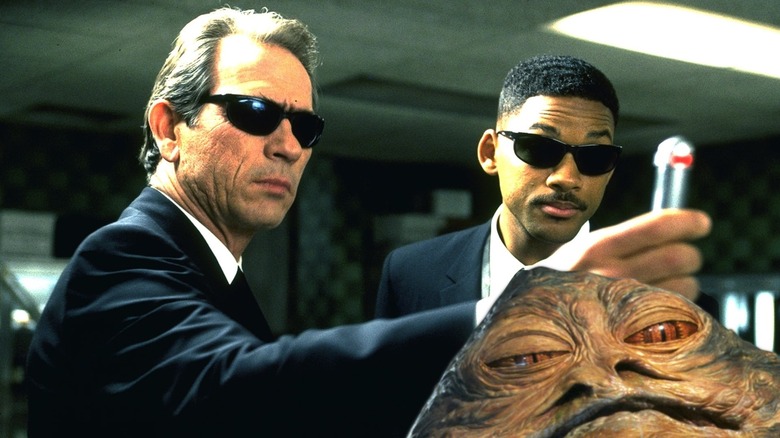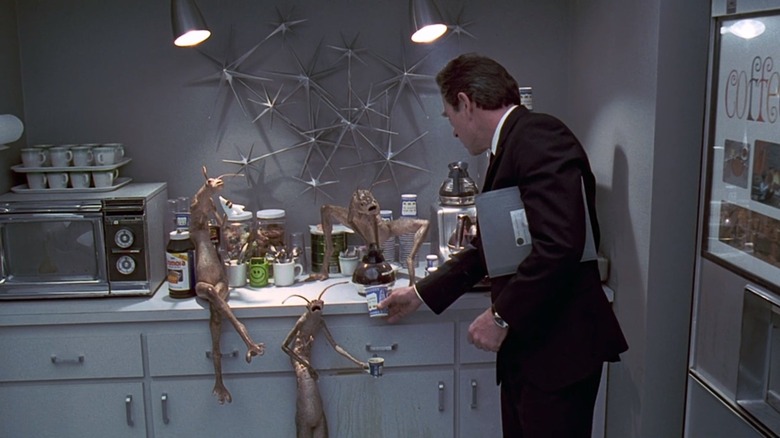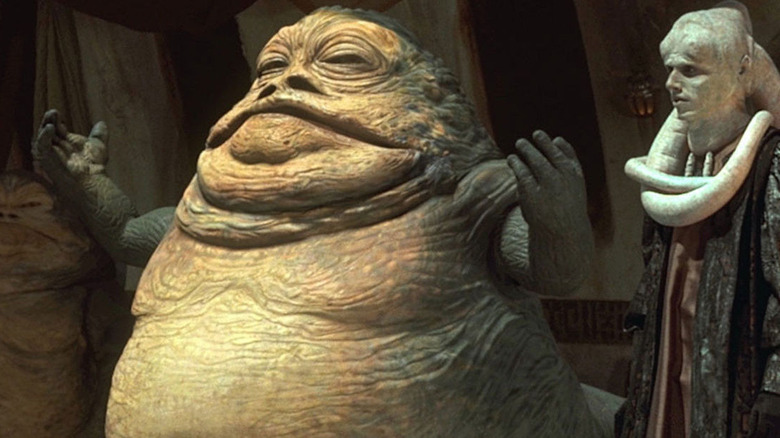The Long-Standing Theory That Connected Star Wars' Jabba The Hutt To Men In Black
Barry Sonnenfeld's 1997 film "Men in Black" was the highest-grossing film (domestically) of 1997. Derived from then-hip urban legends about alien abductions and the suit-clad mystery men called in to cover up the evidence, "Men in Black" hit a sweet spot with audiences, blending sci-fi mayhem, quirky special effects, and the sheer overwhelming star power of Will Smith and Tommy Lee Jones to create one of the decade's defining blockbusters. Although the more significant cinematic advances of the decade were being made within a growing, robust indie scene, over on the studio side of the fence, audiences were in the mood for high-profile sci-fi. 1996 saw the ultra-success of "Independence Day," and films like "The Lost World: Jurassic Park" and "Armageddon" made almost half a billion between them.
Geeks were also at the beginning of an ascendency, as proven by the 1997 release of the "Star Wars" Special Editions. Filmmaker George Lucas, armed with the latest in CGI special effect technology, went back to "Star Wars," "The Empire Strikes Back" and "Return of the Jedi" and remastered — and with some scenes, redid entirely — the films' effects shots. The Special Editions were a pivotal moment for a lot of growing Star Wars fans as the films were largely only available on home video for about 15 years. It's also worth noting that there is a conversation about "Return of the Jedi" in Kevin Smith's 1994 indie hit "Clerks," proving that overwrought discussions about pop sci-fi were on the cusp of being normalized.
Out of this primordial pop ooze grew a fan theory. The worm-like aliens in "Men in Black" might possibly be speaking the same language as Jabba the Hutt in "Return of the Jedi." Are those worms of the same species??
No, but it's fun to overthink.
A Galaxy Far, Far Away
Is it possible that the worms from "Men in Black" are the same species as Jabba the Hutt? Sure. Why not? All we know about the "Star Wars" movies in their relation to Earth is that they took place "a long time ago" in "a galaxy far, far away." The nearest galaxy to the Milky Way is the Canis Major dwarf galaxy, and that's a hefty 25,000 lightyears off. No matter how fast the ships are in "Star Wars," it would take untold generations for the aliens from there to travel to our planet.
So perhaps there was a great cataclysm on the Hutt homeworld — or even throughout the "Star Wars" galaxy — and all of the outsize, slug-shaped aliens boarded long-range escape vessels, looking for a new home. Because it would take millions of years to reach Earth, the Hutt aliens would eventually evolve to consume fewer resources, growing smaller in size and evolving to match life on a spaceship. The entire "Star Wars" galaxy — let's call it the Blue Milky Way — was long extinguished by the time the smaller Hutts arrived on Earth in the 1990s to be taken in by the Men in Black. Perhaps usually, even through untold generations of evolution, the Hutt worms still spoke the same language. For context, the oldest human words still in use to this day are only about 10,000 years old.
Nonetheless, rumors have persisted that the worms and Jabba the Hutt are indeed speaking the same language, or that, at the very least, their languages are derived from a similar syntactic root.
Zambumba, Cahuengas
Others have noted that Jabba lives the life of a well-fed hedonist, and, in "Return of the Jedi" is never seen off of his triclinium. The "Men in Black" worms, at least in their handling of coffee products, seem to possess a similar devil-may-care attitude toward food. It's a stretch, but when has that ever stopped internet nerds?
The idea that the worms were speaking Huttese has been dispelled numerous times over, however. In a 2022 oral history from Inverse, voice actor Brad Abrell set the record straight, saying:
"The script called for the worm guys to be conversing in some gibberish alien language in the coffee room. When Tommy Lee Jones asked my worm, 'Don't tell me we only have that powdered stuff,' my answer to him was just improvised gibberish on the spot. A few words here and there were crafted beforehand: 'zabumba', 'cahuengas', etc. Contrary to growing internet rumors, the language is not an offshoot of Huttese."
Furthermore, according to an article in SyFy Wire, screenwriter Ed Solomon made no reference to "Star Wars" or to Jabba the Hutt when writing about the worms. Indeed, the worm language is described as "a combination of Esperanto and microphone feedback." The Esperanto part might, if you squint, be applied to Jabba the Hutt, but he has no "microphone feedback" qualities to his vocals.
The best that might be said is that both Jabba and the Worms are of a similar annelid-like species, although both appear to be vertebrates. Whether or not the Worms come from a galaxy far away or, more practically, our own, is not made clear.


